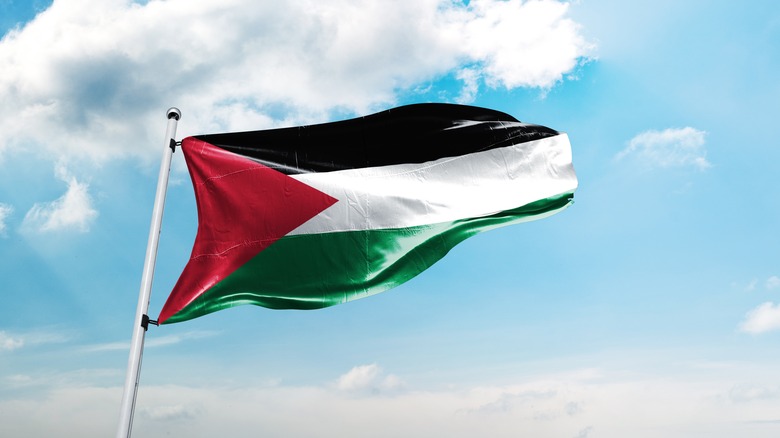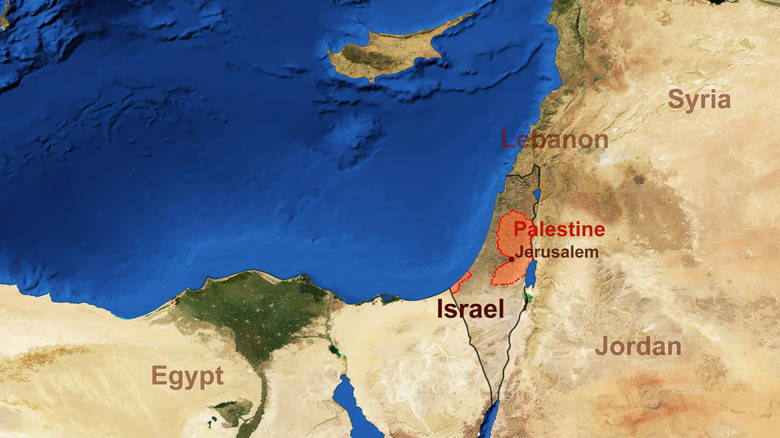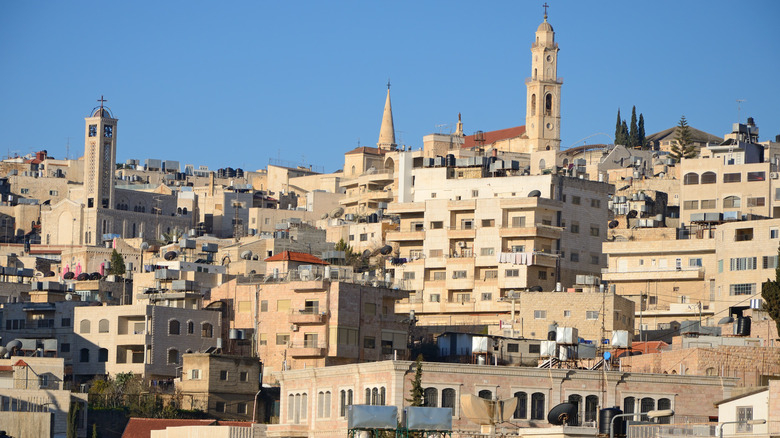Why Some Countries Don't Recognize Palestine
For as long as Palestine has existed, it's been contested. According to Britannica and History, the word "Palestine" comes from "Philistia," the word Greek writers used to describe the Philistines, a group of likely Greek-related, seafaring peoples who settled in the area northeast of Egypt in the 12th century B.C.E. Over the years, various peoples have called the region home: The Philistines, the Canaanites, the Jews, the Persian Empire, Alexander the Great's dynasty, the Roman Empire, the Ottoman Empire, and more, all the way to the 21st century. Along the way, and across thousands of years, the region took on another significant name of importance to Jews, Christians, and Muslims the world over — a name that would determine its indeterminate fate: the Holy Land.
But, it was the early- to mid-20th century that led directly to Palestine's currently disputed political status as a recognized, sovereign nation. Under the Ottoman Empire (1517 to 1917 C.E.), Palestine wasn't a country, but an administrative region. Open Democracy explains that towards the tail end of World War I in 1917, the British took over Palestine from the Ottoman Empire, a country aligned with the opposing Central Powers. The British originally designated it a Jewish home, but the United Nations decided to split Palestine into two parts in 1947 following World War II: Arab-occupied Palestine and Jewish-occupied Israel. Palestinian Arabs didn't agree with the decision, and the following Arab-Israel War left Palestine's borders unsettled — and the country's status in question to this day.
Troubled borders and a troubled government
The current shape of Palestine's borders reflects its recent, troubled past. Palestine has shrunk over time from its original, 1947 UN-proposed borders to its more commonly known 1967 borders (shown above) that split Palestine into two sections: The eastern West Bank along the Dead Sea, and the western Gaza along the shore of the Mediterranean Sea. Right in the middle lies Israel. The Global Centre for the Responsibility to Protect, however, states that this 1967 border is illegal in and of itself, and that Israel has unlawfully occupied the parts of Palestine that created the border.
The Business Standard details further issues related to declaring Palestine an officially recognized state, chiefly political stability and a unified government, neither of which Palestine has ever really had. In fact, since 2007 the entirety of the western part of Palestine — Gaza — has been occupied by the militant, extremist Islamic group Hamas. Hamas is one of two major political powers in Palestine's legal government, the other being the more moderate political party, Fatah, which controls the Palestinian National Authority in the West Bank. This essentially means that an internationally recognized terrorist organization has Gaza in a stranglehold. And, as recent as 2017, then-leader of Hamas Khaled Meshaa said that he will not honor any Palestinian borders but the ones outlined in 1967, also per Al Jazeera.
An uncertain future
The United Nations describes Palestine as a "non-member observer state," i.e., a partially recognized nation along the lines of Taiwan or Kosovo. At present, 138 United Nations member states out of 193 recognize Palestine as a legitimate country, World Population Review reports. Notably, those countries that do not recognize Palestine as a legitimate country largely comprise the world's Anglosphere (English-speaking countries) and Western European nations. Interestingly, Israel is also a partially recognized nation — recognized by 162 countries — but has gained enough acceptance to join the United Nations.
At present, Palestine's future as a nation remains uncertain. So long as Hamas — a terrorist organization conducting assaults against Israel, a U.N.-recognized nation-state — dominates one entire chunk of Palestine, it's difficult to see how more countries across the world could recognize its statehood. Coupled with the questionable formation of the modern state of Palestine to begin with, the acrimonious relationship between Palestine and Israel, and the globe's emotionally charged, religiously-glossed outlook on the situation, and it's difficult to see any resolution in the near future.
Some governments, like the U.K. parliament, have made their position on Palestine's statehood clear. As the U.K. Parliament said in a 2020 statement: "We are clear that we want to see the creation of a sovereign, independent and viable Palestinian state — living in peace and security, side by side with Israel. The U.K. will recognize a Palestinian state at a time when it best serves the objective of peace."


